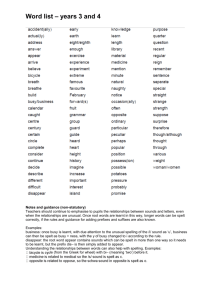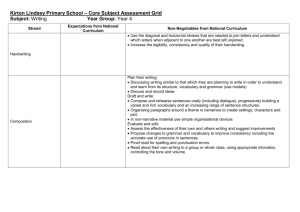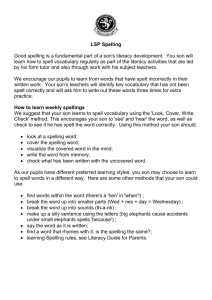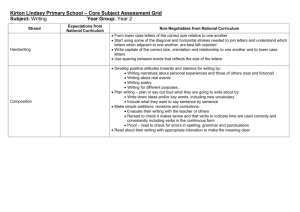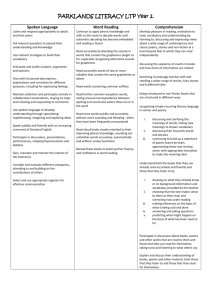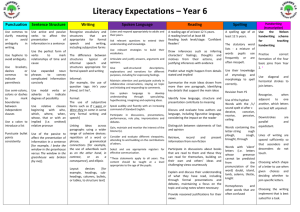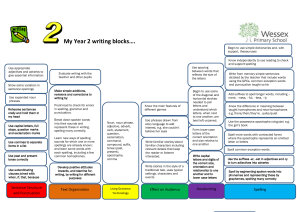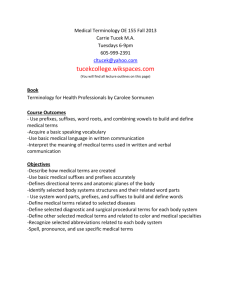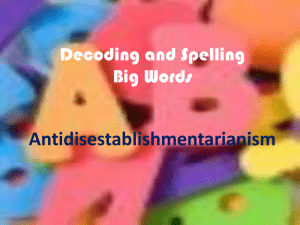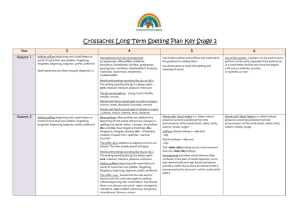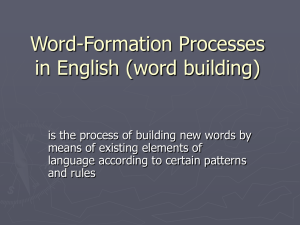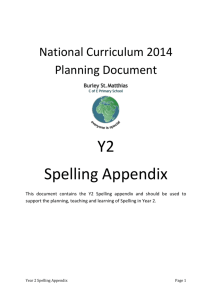Spelling Progression Map for the New Curriculum
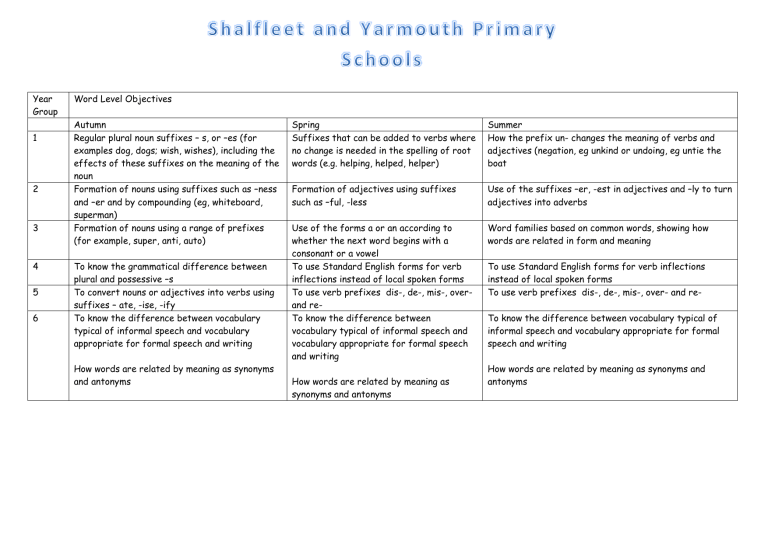
5
6
Year
Group
1
Word Level Objectives
2
3
4
Autumn
Regular plural noun suffixes – s, or –es (for examples dog, dogs; wish, wishes), including the effects of these suffixes on the meaning of the noun
Formation of nouns using suffixes such as –ness and –er and by compounding (eg, whiteboard, superman)
Formation of nouns using a range of prefixes
(for example, super, anti, auto)
To know the grammatical difference between plural and possessive –s
To convert nouns or adjectives into verbs using suffixes – ate, -ise, -ify
To know the difference between vocabulary typical of informal speech and vocabulary appropriate for formal speech and writing
How words are related by meaning as synonyms and antonyms
Spring
Suffixes that can be added to verbs where no change is needed in the spelling of root words (e.g. helping, helped, helper)
Formation of adjectives using suffixes such as –ful, -less
Use of the forms a or an according to whether the next word begins with a consonant or a vowel
To use Standard English forms for verb inflections instead of local spoken forms
To use verb prefixes dis-, de-, mis-, over- and re-
To know the difference between vocabulary typical of informal speech and vocabulary appropriate for formal speech and writing
How words are related by meaning as synonyms and antonyms
Summer
How the prefix un- changes the meaning of verbs and adjectives (negation, eg unkind or undoing, eg untie the boat
Use of the suffixes –er, -est in adjectives and –ly to turn adjectives into adverbs
Word families based on common words, showing how words are related in form and meaning
To use Standard English forms for verb inflections instead of local spoken forms
To use verb prefixes dis-, de-, mis-, over- and re-
To know the difference between vocabulary typical of informal speech and vocabulary appropriate for formal speech and writing
How words are related by meaning as synonyms and antonyms
Year
1
2
3/4
5/6
Objectives
To spell words containing each of the 40+ phonemes already taught
To know the common exception words
To spell the days of the week
To name the letters of the alphabet
To name the letters of the alphabet in order
To use the letter names to distinguish between alternative spellings of the same sound
To add prefixes and suffixes
To use the spelling rule for adding –s and –es as the plural marker for nouns and the third person singular marker for verbs
To use the prefix un-
To use –ing, -ed, -er and –est where no change is needed in the spelling of root words
To write from memory simple sentences dictated by the teacher that include words using the GPCs and common exception words taught so far
To spell by segmenting spoken words into phonemes and representing these by graphemes, spelling many correctly
To learn the new ways of spelling phonemes for which one or more spellings are already known, and learn some words with each spelling, including a few common homophones
To learn to spell common exception words
To learn to spell words with contracted forms
To learn the possessive apostrophe
To distinguish between homophones and near homophones
To add suffixes to spell longer words, e.g. –ment, -ness, -ful, -less, -ly
To write from memory simple sentences dictated by the teacher that include words using the GPCs, common exception words and punctuation taught so far
To use further prefixes and suffixes and understand how to add them
To spell further homophones
To spell words that are often misspelt
To place the possessive apostrophe accurately in words with regular plurals and in words with irregular plurals
To use the first two or three letters of a word to check its spelling in the dictionary
To write from memory simple sentences, dictated by the teacher, that include words and punctuation taught so far
To use further prefixes and suffixes and understand the guidelines for adding them
To spell some of the words with ‘silent’ letters
To continue to distinguish between homophones and other words which are often confused
To use the morphology and etymology in spelling and understand that the spelling of some words needs to be learned specifically
To use dictionaries to check the spelling and meaning of words
To use the first three or four letters of a word to check spelling, meaning or both of these in a dictionary
To use a thesaurus
Year
1 a-e er er ir ur oo oo oa ar ee ea ea e-e i-e o-e u-e
Objectives
Revision of Reception work
All letters of the alphabet and the sounds which they most commonly represent
Consonant diagraphs which have been taught and the sounds which they represent
Vowel diagraphs which have been taught and the sounds which they represent
The process of segmenting spoken words into sounds before choosing graphemes to represent the sounds
Words with adjacent consonants
The sounds /f/, /l/, /s/, /z/ and /k/ spelt ff, ll, ss, zz and ck
The ‘n’ sound spelt n before k
Division of words into syllables
-tch
The /v/ sound at the end of words
Adding s and es to words
Adding the endings –ing, -ed and –er to verbs where no change is needed to the root word
Adding –er and –est to adjectives where no change is needed to the root word
Vowel diagraphs and trigraphs ai oi ay oy
Example Words
Off, well, miss, buzz, back
Bank, think, sunk, honk
Pocket, rabbit, carrot, thunder, sunset
Catch, fetch, kitchen, notch, hutch
Have, live, give
Cats, dogs, spends, rocks, thanks, catches
Hunting, hunted, hunter, buzzing, buzzed, buzzer, jumping, jumped, jumper
Grander, grandest, fresher, freshest, quicker, quickest
Rain, wait, train, paid, afraid
Oil, join, coin, point, soil
Day, play, say, way, stay
Boy, toy, enjoy, annoy
Made, came, same, take, safe
These, theme, complete
Five, ride, like, time, side
Home, those, woke, hope, hole
June, rule, rude, use, tube, tune
Car, start, park, arm, garden
See, tree, green, meet, week
Sea, dream, meat, each, read (present tense)
Head, bread, meant, instead, read (past tense)
Her, term, verb, person
Better, under, summer, winter, sister
Girl, bird, shirt, first, third
Turn, hurt, church, burst, Thursday
Food, pool, The Moon, zoo, soon
Book, took, foot, wood, good
Boat, coat, road, coach, goal
or ore aw au air ear ear oe ou ow ow ue ew ie ie igh are
Words ending in –y
New consonant spellings ph and wh
Using k for the /k/ sound
Adding the prefix un-
Compound words
Common exception words
Toe, goes
Out, about, mouth, around, sound
Now, how, brown, down town
Own, blow, snow, grow, show
Blue, clue, true, rescue, Tuesday
New, few, grew, flew, drew, threw
Lie, tie, pie, cried, tried, dried
Chief, field, thief
High, night, light, bright, right
For, short, born, horse, morning
More, score, before, wore, shore
Saw, draw, yawn, crawl
Author, August, dinosaur, astronaut
Air, fair, pair, hair, chair
Dear, hear, beard, near, year
Bear, pear, wear
Bare, dare, care, share, scared
Very, happy, funny, party, family
Dolphin, alphabet, phonics, elephant, when, where, which, wheel, while
Kent, sketch, kit, skin, frisky
Unhappy, undo, unload, unfair, unlock
Football, playground, farmyard, bedroom, blackberry
The, a, do, to, today, of, said, says, are, were, was, is, his, has, I, you, your, they, be, he, me, she, we, no, go, so, by, my, here, there, where, love, come, some, one, once, ask, friend, school, put, push, pull, full, house, our, and/or, others.
2 Revision Year 1
As words with new GPCs are introduced, many previously taught GPCs can be revised at the same time as these words will usually contain them
The ge and dge sound at the end of words, and sometimes spelt as g elsewhere in the words before e, i and y
The /s/ sound spelt c before e, i and y
The /n/ sound spelt kn and gn at the beginning of words
The /r/ sound spelt wr at the beginning of words
The /l/ or /el/ sound spelt –el at the end of words
The /l/ or /el/ sound spelt –al at the end of words
The words ending ‘il’
The /ai/ sound spelt –y at the end of words
Adding –es to nouns and verbs ending in –y
Adding –ed, ing, -er, and –est to a root word ending in –y with a consonant before it
Adding the endings –ing, -ed, -er, -est and –y to words ending in –e with a consonant before it
Adding –ing, -ed, -er, -est and –y to words of one syllable ending in the single consonant letter after a single vowel letter
Words with the sound spelt a before l and ll
The variation of the /o/ sound
The /l:/ sound spelt ey
The sound spelt a after w and qu
The sound spelt or after w
The sound spelt ar after w
The sound spelt s
The suffixes –ment, -ness, -ful, -less and –ly
Contractions
The possessive apostrophe
The words ending in -tion
The homophones and near homophones
Common exception words
Badge, edge, bridge, dodge, fudge
Age, huge, change, charge, bulge, village
Gem, giant, magic, giraffe, energy
Jacket, jar, jog, join, adjust
Race, ice, cell, city, fancy
Knock, know, knee, gnat, gnaw
Write, written, wrote, wrong, wrap
Camel, tunnel, squirrel, travel, towel, tinsel
Metal, pedal, capital, hospital, animal
Pencil, fossil, nostril
Cry, fly, dry, try, reply, July
Flies, tries, replies, copies, babies, carries
Copied, copier, happier, happiest, cried, replied
Copying, crying, replying
Hiking, hiked, hiker, nicer, nicest, shiny
Patting, patted, humming, hummed, dropping, dropped, sadder, saddest, fatter, fattest, runner, runny
All, ball, call, walk, talk, always
Other, mother, brother, nothing, Monday
Key, donkey, monkey, chimney, valley
Want, watch, wander, quality, squash
Word, work, worm, world, worth
War, warm, towards
Television, treasure, usual
Enjoyment, sadness, careful, playful, hopeless, plainness, badly
Merriment, happiness, plentiful, penniless, happily
Can’t, didn’t, hasn’t, couldn’t, it’s, I’ll
Megan’s, Ravi’s, the girl’s, the child’s, the man’s
Station, fiction, motion, national, section
There/their/they’re, here/hear, quite/quiet, see/sea, bare/bear, one/won, sun/son, to/too/two, be/bee, blue/blew, night/knight
Door, floor, poor, because, find, kind, mind, behind, child, children, wild, climb, most, only, both, old, old, gold, hold, told, every, everybody, even, great, break, steak, pretty,
beautiful, after, fast, last, past, father, class, grass, pass, plant, path, bath, hour, move, prove, improve, sure, sugar, eye, could, should, would, who, whole, any, many, clothes, busy, people, water, again, half, money, Mr., Mrs. Parents,
Christmas
3/4 Revision of work from Year 1 and 2 – Pay special attention to the rules for adding suffixes
Adding suffixes beginning with vowel letters to words with more than 1 syllable
The /i/ sound spelt y elsewhere than at the end of words
The ou sound
More prefixes
The suffix –ation
The suffix –ly
Words with the endings sounding like ure or ture
Endings which sound like sion
The suffix –ous
The endings which sound like –tion, -sion, -ssion, -cian
Forgetting, forgotten, beginning, beginner, prefer, preferred
Gardening, gardener, limiting, limited, limitation
Myth, gym, Egypt, pyramid, mystery
Young, touch, double, trouble, country
Disappoint, disagree, disobey, misbehave, mislead, misspell, inactive, incorrect
Illegal, illegible
Immature, immortal, impossible, impatient, imperfect, irregular, irrelevant, irresponsible
Re- redo, refresh, return, reappear redecorate
Sub- subdivide, subheading, submarine, submerge
Inter – interact, intercity, international, interrelated
Super – supermarket, superman, superstar
Anti- antiseptic, anti-clockwise, antisocial
Auto – autobiography, autograph
Information, adoration, sensation, preparation, admiration
Sadly, completely, usually, finally, comically, happily, angrily
Gently, simply, humbly, nobly
Basically, frantically, dramatically
Measure, treasure, pleasure, enclosure, creature, furniture, picture, nature, adventure
Division, invasion, confusion, decision, collision, television
Poisonous, dangerous, mountainous, famous, various
Tremendous, enormous, jealous
Humorous, glamorous, vigorous
Courageous, outrageous
Serous, obvious, curious
Hideous, spontaneous, courteous
Invention, injection, action, hesitation, completion
Expression, discussion, confession, permission, admission
Expansion, extension, comprehension, tension, musician, electrician, magician, politician, mathematician
Words with the /k/ sound spelt ch
Words with the /sh/ sound spelt ch
Words ending with the /g/ sould spelt –gue and the /k/ sound spelt -que
Words with the /s/ sound spelt sc
Words with the spelling ei, eight or ey
Possessive apostrophe with plural words
Homophones or near homophones
Scheme, chorus, chemist, echo, character
Chef, chalet, machine, brochure
League, tongue, antique, unique
Science, scene, discipline, fascinate, crescent
Vein, weigh, eight, neighbour, they, obey
Girls’, boys’ babies’ children’s, men’s, mice’s
Accept/except, affect/effect, ball/bawl, berry/bury, brake/break, fair/fare, grate/great, groan/grown, here/hear, heel/heal/he’ll, knot/not, mail/male, main/mane, meat/meet, medal/meddle, missed/mist, peace/piece, plain/plane, rain/reign/rein, scene/seen, weather/whether, whose/who’s
5/6
Endings which sound like –cious and –tious
Endings which sound like ‘cial’
Words ending in –ant, -ance, -ancy, -ent, -ence, -ency
Words ending in –able and –ible
Words ending in –ably and -ibly
Adding suffixes beginning with vowel letters to words ending in fer
Use of the hyphen
Words with the sound spelt ei after c
Words containing the letter string ough
Words with silent letters
Homophones and other words which are often confused
Vicious, precious, conscious, delicious, malicious, suspicious, ambitious, cautious, fictitious, infectious, nutritious
Official, special, artificial, partial, confidential, essential
Observant, observance, expectant, expectation, hesitant, hesitancy, tolerant, tolerance, substance, innocent, innocence, decent, decency, frequency, frequency, confident, confidence
Assistant, assistance, obedient, obedience, independent, independence
Adorable/adorably, applicable/applicably, considerable/considerably, tolerable/tolerably
Changeable, noticeable, forcible, legible
Dependable, comfortable, understandable, reasonable, enjoyable, reliable
Possible/possibly, horrible/horribly, terrible/terribly, visible/visibly, incredible/incredibly, sensible/sensibly
Referring, referred, referral, preferring, preferred, transferring, transferred, reference, referee, preference, transference
Co-ordinate, re-enter, co-operate, co-own
Deceive, conceive, receive, perceive, ceiling
Ought, brought, thought, nought, brought, fought, rough, tough, enough, cough, though, although, dough, through, thorough, borough, plough, bough
Doubt, Island, lamb, solemn, thistle, knight
Advice/advise
Devise/device
License/licence
Practise/practice
Prophecy/prophesy
Farther/further
Father/farther
Guest: guessed
Guest: visitor
Heard: hear
Herd: Group of animals
Led: lead
Lead: metal
Morning: before noon
Mourning: grieving for someone who has died
Past: previous time
Past: to pass
Precede: go in front or before
Proceed: go on
Principle: Most important
Principle: Basic truth or belief
Profit: Money made
Prophet: Someone who foretells the future
Stationary: Not moving
Stationery: Paper, envelopes etc…
Steal – take something that does not belong to you
Steel – Metal
Wary: cautious
Weary: Tired
Who’s – who is/who has
Whose-belonging to someone
